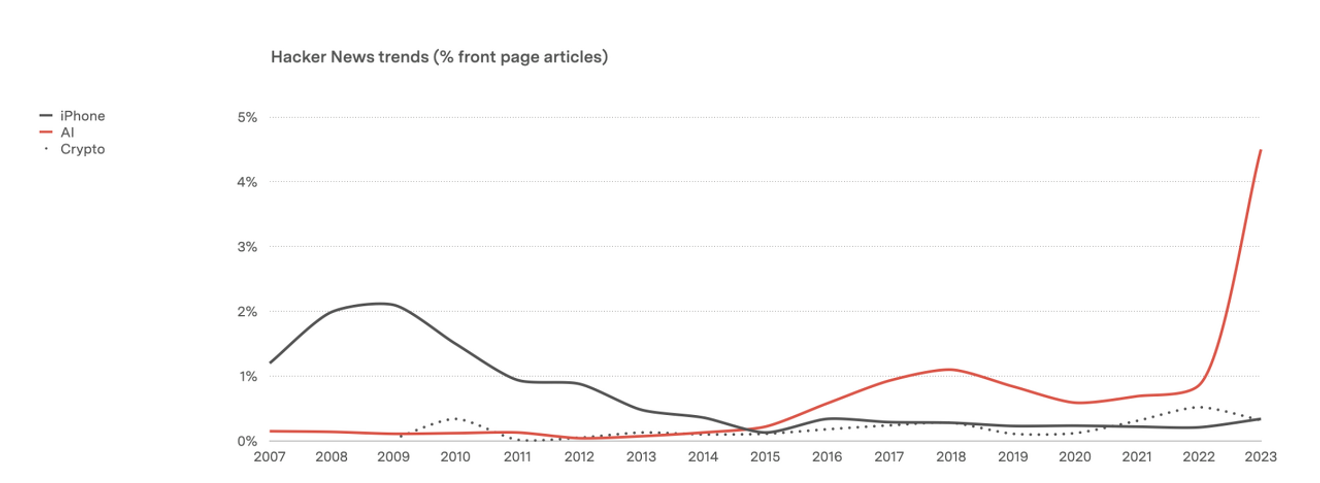Hacker News, a social network where open-source developers check technology trends, recently revealed that 'AI' was mentioned with a 560% increase year-on-year, surpassing keywords like cryptocurrency and iPhone, which had topped tech news headlines for the past 15 years. This signifies AI's growing influence, permeating daily life in 2023 and dominating the tech industry, suggesting that major related trends will continue into next year.

This year marked the beginning of OpenAI's dominance in generative AI, prompting Google and Meta to quickly release their own products, followed by the entry of new players and an open-source boom. Nvidia, a semiconductor company designing GPUs (AI chips), achieved a 40% operating profit margin, while OpenAI, the creator of ChatGPT, which boasts 100 million weekly active users, saw its valuation soar to 113 trillion won despite its non-profit status. Along with these changes in AI investment, the existing complex and conflicting regulatory issues surrounding big tech companies, including privacy, competition, harmful content, bias, intellectual property, and patents, have now expanded to encompass 'AI'.
If we categorize the process of technology introduction and public acceptance into three stages—the S-curve—where value is confirmed, excitement over the confirmed value arises, and then the value becomes mundane, then 2023 can be considered a year where the market potential of artificial intelligence was explored in various ways.
This is supported by the following three observations. First,the platform shift to generative AI has begun.Historically, the major platform shifts in the tech industry have progressed from PCs to web open source and then to cloud computing linked with smartphones. The interaction between users and generative AI, which aims to achieve AGI, has become a new benchmark for predicting the future of humanity.
Second,people had unprecedented opportunities to become familiar with AI.Generative AI integration has been implemented in productivity programs used in daily work by people around the world from Microsoft and Google. Conversations with chatbots linked to internet search engines and various customer service channels have become commonplace for users. The decrease in physical human connections and the fading of established communities that fostered a sense of belonging have provided an opportunity to discover and rapidly confirm the potential of generative AI as an exemplary conversational partner.
Third,the EU formally reached an agreement on a new AI law.This legislation is the world's first comprehensive AI law, including provisions to mitigate or prohibit AI usage in areas where it poses significant risks to fundamental rights, such as healthcare, education, border control, and public services. The establishment of binding rules for addressing the potential risks of indiscriminate AI use represents a significant step towards a more mature approach to adopting AI, a substantial shift compared to previous market and societal contexts.

2023 undoubtedly appears to have been the year of AI. However, while we were enthusiastic about AI's potential as a tool, the year also saw the expansion of dystopian anxieties about the future that AI might create for humanity at an individual and everyday level, anxieties for which there is no experiential context. In other words, alongside the interest in AI,we were compelled to contemplate ‘the meaning of being human’ in a very concrete way.Keywords like design thinking and customer-centricity, which had emphasized the human element for over 15 years, now seem to have been overshadowed by AI. However, just as we switch from shorts to long pants with the changing seasons, our interest in ‘humanity’ will eventually return. This overemphasis on the distinction between machines and humans stems from the recent explosion of discussions surrounding the capabilities and potential of AI.
Humans are fundamentally distinct from AI through the very basic categories of time and space.Holidays and festivals feel warmer or more human than other times. The meaning we derive from walking up the steps of a courthouse varies depending on our circumstances and relationships, and this experience is unique to humans. In a blog post on December 19th, Bill Gates, the founder of Microsoft, predicted that 2024 will be a year of transformation through AI technology. As AI technology matures further, next year should present more opportunities to focus on the questions of humanity, particularly the elements that give rise to our experience of time and space—the environment we live in, the situations we face, and our relationships with others—which are stages unique to humans. This will be a crucial topic for 2024, as it will constitute the process of concretizing the form of human-AI coexistence.
References
Comments0